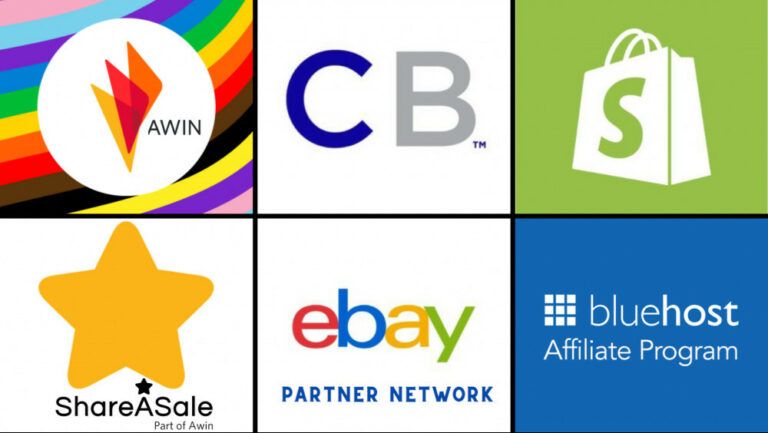Best Types Of Affiliate Marketing Channels

Best Types Of Affiliate Marketing Channels
Affiliate marketing has grown in popularity and effectiveness as a passive revenue generation for people and organizations.
It involves a partnership between merchants, advertisers, and affiliates promoting the products or services and earning a commission for every successful referral or sale.
The numerous channels affiliates can use to advertise their products and connect with their target market are one of the most important elements of affiliate marketing.
These channels offer different opportunities and strategies for affiliates to maximize their earning potential and drive conversions.
This article will explore the different affiliate marketing channels and how they can be utilized to create successful affiliate marketing campaigns.
Whether through websites and blogs, social media platforms, email marketing, or other innovative methods, each channel offers unique advantages and considerations for affiliates and merchants.
What Are Affiliate Marketing Channels
Affiliate marketing channels, also known as affiliate marketing platforms or networks, are online platforms that connect affiliates (publishers) with merchants (advertisers) who offer affiliate programs.
These channels facilitate the tracking, management, and payment of affiliate commissions.
Want to Start Making Money Online?
Try My #1 Recommendation Program!
They provide a centralized platform for affiliates to find and join affiliate programs, access affiliate links and promotional materials, track their performance, and receive payments.
Affiliate marketing channels act as intermediaries between affiliates and merchants, handling the technical aspects of the affiliate marketing process.
They provide various services, including affiliate program management, tracking, reporting, and commission payments. Some popular affiliate marketing channels include:
1. Amazon Associates
Amazon's affiliate program allows affiliates to promote and earn commissions from a wide range of products sold on the Amazon marketplace.
2. Commission Junction
Commission Junction (CJ) is one of the largest affiliate marketing networks, connecting affiliates with merchants across different industries.
3. ShareASale
ShareASale is an affiliate marketing platform that offers a wide range of affiliate programs and provides affiliates with access to various promotional materials and reporting tools.
4. Rakuten Advertising
Formerly known as LinkShare, Rakuten Advertising is a global affiliate marketing network that connects affiliates with merchants across different countries and industries.
5. ClickBank
ClickBank specializes in digital products, allowing affiliates to promote and earn commissions from a wide range of e-books, online courses, software, and more.
6. Impact
Impact is an affiliate marketing platform that provides advanced tracking and reporting capabilities and tools for managing partnerships and influencer campaigns.
These affiliate marketing channels serve as valuable resources for affiliates, providing them access to a wide range of affiliate programs and merchants.
Want to Find Out How To Start Your Home-Based Business?
Try My #1 Recommendation Platform!
Affiliates can choose the channels that align with their niche, target audience, and promotional strategies to maximize their earning potential.
How Do Affiliate Marketing Channels Work?
Affiliate marketing channels connect affiliates (publishers) with merchants (advertisers) who offer affiliate programs. The merchant sets up an affiliate program through an affiliate marketing channel.
They define the commission structure, terms, and conditions and provide promotional materials such as affiliate links, banners, and product feeds.
Affiliates interested in promoting the merchant's products or services join the affiliate program through the affiliate marketing channel.
They provide their information and agree to the program's terms and conditions. Affiliates receive unique affiliate links or tracking codes from the affiliate marketing channel.
They incorporate these links into their website, blog, social media posts, emails, or other promotional channels.
When a potential customer clicks on an affiliate link, the affiliate marketing channel tracks the referral by placing a cookie or tracking code on the visitor's device.
This allows the channel to identify which affiliate referred the customer.
Suppose the referred customer completes a desired action, such as purchasing or signing up for a service. In that case, the affiliate marketing channel records the conversion and attributes it to the respective affiliate.
The affiliate marketing channel calculates the commission based on the predefined commission structure.
This can be a percentage of the sale value, a fixed amount per sale, or other criteria established by the merchant.
Affiliates can access reporting and analytics tools the affiliate marketing channel provides to track their performance, including clicks, conversions, and commissions earned.
They can gain insights into the most effective strategies and optimize their promotional efforts accordingly.
The affiliate marketing channel handles the payment process, ensuring affiliates receive their commissions promptly.
Payout methods may include direct bank transfer, PayPal, or other payment options the track supports.
Overall, affiliate marketing channels streamline the process of affiliate marketing by providing a centralized platform for affiliates to find and join programs, access promotional materials, track performance, and receive payments.
They also offer merchants a way to expand their reach and increase sales by tapping into the affiliate marketing network.
Types Of Affiliate Marketing Channels
Affiliate marketing channels are platforms or networks that facilitate the relationship between affiliates (publishers) and merchants (advertisers) in affiliate marketing.
These channels provide a centralized platform for affiliates to find and join affiliate programs, access promotional materials, track performance, and receive commissions. Here are the common types of affiliate marketing channels:

1. Affiliate Networks
Affiliate networks are crucial in the affiliate marketing ecosystem. They act as intermediaries connecting affiliates with merchants looking to promote their products or services through affiliate partnerships.
These networks provide a centralized platform where affiliates can browse various affiliate programs from different industries, making it convenient to find suitable partnerships.
One of the main advantages of affiliate networks is the diverse range of programs they offer. Affiliates can find programs that align with their niche, interests, and target audience.
These networks feature programs from various industries, including fashion, technology, health and wellness, home decor, and more.
This allows affiliates to choose programs that resonate with their content and audience, increasing the likelihood of successful promotions.
Affiliate networks also provide affiliates with access to affiliate links and creatives.
Affiliates can get distinctive affiliate links or tracking codes that they can use in their material, such as blog articles, social media posts, or YouTube videos, if they sign up for a program inside the network.
Affiliates can efficiently advertise the products using the banners, product photos, and other marketing materials the networks frequently offer.
Are You Tired Of Scams?
Try The Most-Trusted Training Platform To Make Money Online!
Another benefit of affiliate networks is the consolidated payment system. Instead of dealing with multiple merchants individually, affiliates receive close payments from the web.
This simplifies the payment process and reduces administrative tasks for affiliates. They can track their earnings, view performance reports, and receive payments from a single source, making it more convenient and efficient.
Affiliate networks also offer additional support and resources to affiliates.
They provide educational materials, webinars, and forums where affiliates can learn about best practices, industry trends, and strategies to optimize their affiliate marketing efforts.
Some networks may offer affiliate managers who can provide guidance, answer questions, and support affiliates.

2. In-House Affiliate Programs
In-house affiliate programs are managed directly by the merchant or advertiser without the involvement of an affiliate network.
With in-house programs, merchants take full control of their affiliate relationships and can customize their programs according to their specific requirements.
One of the primary advantages of in-house affiliate programs is the level of control merchants have over their affiliate partnerships.
They can handpick affiliates aligning with their brand values and target audience, ensuring that the partnerships fit their business well.
Additionally, merchants can establish direct communication channels with their affiliates, fostering a closer relationship and allowing for better collaboration and support.
In-house programs also allow merchants to customize commission structures and program features to suit their needs.
They can set commission rates, performance tiers, and incentives based on their marketing goals and budget.
This flexibility allows merchants to create unique and attractive offers for affiliates, motivating them to promote their products or services.
Managing an in-house affiliate program requires affiliate tracking software or affiliate management platforms.
These tools help merchants track affiliate referrals, monitor sales and conversions, and generate affiliate reports.
They also provide affiliates with unique tracking links, creatives, and access to program resources.
Merchants can choose to develop their tracking software or use existing affiliate management platforms available in the market.
In-house affiliate programs can benefit merchants with the resources and expertise to manage their programs internally.
They can build strong relationships with their affiliates, have more control over program features and commission structures, and potentially save on network fees associated with third-party affiliate networks.

3. Affiliate Marketplaces
Affiliate marketplaces serve as centralized platforms that bring together merchants and affiliates.
These marketplaces provide various affiliate programs across multiple industries, making it convenient for affiliates to explore and join programs that align with their niche or interests.
For affiliates, affiliate marketplaces offer a one-stop destination to discover and compare different affiliate programs. They can browse through various programs, each with its commission structure, promotional materials, and tracking systems.
Affiliates can evaluate the program's potential, choose the ones that resonate with their audience, and easily join them through the marketplace's platform.
On the other hand, merchants benefit from affiliate marketplaces by gaining exposure to a large pool of potential affiliates.
By listing their programs on these platforms, merchants can attract mates actively searching for relevant programs to promote.
The marketplace also provides tools and resources for merchants to manage their schedules, track affiliate performance, and streamline the affiliate recruitment process.
Affiliate marketplaces offer additional convenience for affiliates and merchants through user-friendly interfaces.
They provide access to promotional materials such as banners, links, and widgets, making it easier for affiliates to promote the merchant's products or services.
Merchants can leverage the marketplace's tracking systems to monitor affiliate performance, track conversions, and ensure accurate commission calculations.

4. Influencer Networks
Influencer networks are specialized platforms catering to influencers and content creators.
These networks serve as a bridge between influencers and brands, facilitating collaborations and partnerships.
Influencers can join these networks to discover brand opportunities, negotiate partnership terms, access promotional materials, and track their performance and earnings.
For influencers, joining an influencer network provides access to various brand collaborations and campaigns.
They can browse through available opportunities, apply to those that align with their niche and audience, and negotiate the terms of the partnership.
Influencer networks often provide tools and resources to help influencers create high-quality content, track engagement metrics, and ensure transparency regarding commissions or compensation.
On the other hand, brands benefit from influencer networks by gaining access to a pool of curated and vetted influencers actively seeking collaboration opportunities.
These networks often offer tools to streamline influencer selection, allowing brands to find influencers who match their target audience, brand values, and campaign objectives.
Brands can also leverage the network's tracking and reporting features to measure the success of influencer campaigns and assess the return on investment.
Influencer networks provide a supportive ecosystem for influencers and brands to connect and collaborate.
They facilitate efficient communication, contract negotiations, content creation, and campaign management.
These networks often offer additional support, such as influencer education, brand guidelines, and campaign optimization tips to ensure successful collaborations and mutual benefits for influencers and brands.

5. Affiliate Tracking Software
Affiliate tracking software is valuable for merchants who want to manage their affiliate programs independently.
These software solutions offer a range of features and functionalities designed to streamline the affiliate program management process.
One of the key functions of affiliate tracking software is to track affiliate referrals and conversions.
It generates unique affiliate links for each affiliate, allowing merchants to accurately attribute sales or leads generated by affiliates.
The software tracks clicks, conversions, and other relevant metrics, providing detailed reports on affiliate performance and commission calculations.
Affiliate tracking software also enables merchants to manage affiliate payouts and commissions. It automates the commission calculation process based on the predefined commission structure and tracks affiliate earnings.
Merchants can easily set commission rates, create tiered structures, and customize commission rules to align with business objectives.
The software generates payment reports, making it easier for merchants to process affiliate payments accurately and efficiently.
Additionally, affiliate tracking software often provides affiliates various promotional tools and resources.
These tools may include banner ads, widgets, product feeds, and other marketing materials that affiliates can use to promote the merchant's products or services.
Some software solutions offer advanced features like affiliate recruitment modules, affiliate communication systems, and fraud detection mechanisms to enhance program management and security.
Using affiliate tracking software, merchants can effectively manage their affiliate programs, track affiliate performance, automate commission calculations, and provide affiliates with the necessary tools and resources.
This streamlines the affiliate management process and ensures transparency and accuracy in affiliate tracking and commission payments.

6. Content Creation Platforms
Content creation platforms play a vital role in affiliate marketing by connecting affiliates who are content creators with brands seeking content promotion.
These platforms provide a marketplace where brands can discover and collaborate with content creators with a specific niche or audience.
Affiliates, on the other hand, can leverage these platforms to find relevant brand partnerships and monetize their content.
Content creation platforms typically offer features and tools that facilitate the collaboration process.
They enable affiliates to showcase their work, create engaging content, and promote the brand's products or services through various channels.
Affiliates can publish blog posts, articles, videos, or social media posts highlighting the brand's offerings and including affiliate links to drive traffic and conversions.
Brands benefit from content creation platforms by gaining exposure to the affiliates' audience and leveraging their expertise in compelling content.
The brand's products or services are showcased authentically and engagingly, which can lead to increased brand awareness, customer trust, and, ultimately, conversions.
Affiliates who participate in content creation programs earn commissions for the sales or leads generated through their content.
The commission structure is typically based on predefined terms, such as a percentage of the sale value or a fixed amount per lead.
Want To Learn How To Create Your Own Website And Online Business?
Try My #1 Recommendation Training And Hosting Platform!
The platforms provide tracking mechanisms to accurately attribute conversions to the respective affiliates, ensuring fair and transparent commission payouts.
Content creation platforms offer a win-win situation for both affiliates and brands. Affiliates can monetize content creation skills and leverage their audience to generate income.
At the same time, brands can tap into the creativity and influence of content creators to expand their reach and drive sales.
These platforms provide a streamlined and efficient way for content creators and brands to collaborate, fostering mutually beneficial relationships in affiliate marketing.
Conclusion
In conclusion, affiliate marketing channels provide various opportunities for affiliates and merchants to connect, collaborate, and achieve mutual success.
Whether through affiliate networks, in-house programs, marketplaces, influencer networks, tracking software, or content creation platforms, each channel offers unique benefits and advantages.
Affiliates can leverage these channels to find relevant programs, access promotional materials, and earn commissions for their efforts.
Conversely, merchants can tap into the vast affiliate network and expand their reach, driving sales and achieving their business goals.
The beauty of affiliate marketing channels lies in their ability to create symbiotic relationships, where affiliates can monetize their skills and influence while helping merchants increase their brand visibility and sales.
By embracing and utilizing the various affiliate marketing channels available, both affiliates and merchants can thrive in the dynamic and ever-growing world of affiliate marketing.
I trust you enjoyed this article on the Best Types Of Affiliate Marketing Channels. Please stay tuned for more articles to come.
Take care!
JeannetteZ
Want to Learn How to Build Your Own Home-Based Online Business & Start Making Money Online From Your Comfortable Couch?
Try Wealthy Affiliate!
Your Opinion Is Important To Me
Thoughts? Ideas? Questions? I would love to hear from you. Please leave me your questions, experiences, remarks, and suggestions on the Best Types Of Affiliate Marketing Channels article in the comments below. You can also contact me by email at Jeannette@WorkFromAnywhereInTheWorld.com.
Disclosure
This post may contain affiliate links. I earn from qualifying purchases as an Amazon Associate and other affiliate programs. Please read my full affiliate disclosure.
You may also enjoy the following articles:
Wealthy Affiliate Review – Scam or Legit? The Truth Exposed
Different Types Of Affiliate Marketing
Best Twitter Marketing Strategies








